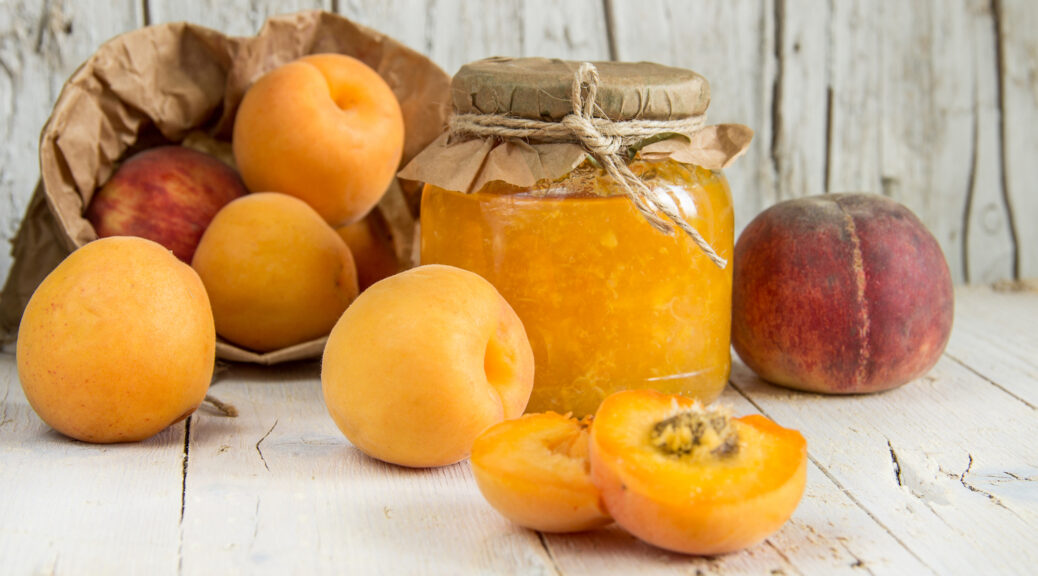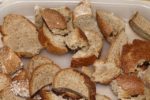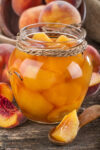
Ways to Preserve Peaches
People who lived during the 1800s ate fresh fruit in season, but they needed ways to preserve fruit for other times. Apricots, nectarines and large plums were also preserved in the same ways as peaches.
There are two types of peaches; freestone and clingstone and several varieties within each type. Freestone peaches are easy to eat out of hand, since the pit (stone) easily pulls away from the fruit once you bite or cut into the peach. The flesh of the clingstone peach clings tightly to the pit and you have to eat around it or cut around it with a knife.
INFORMATION BELOW COMPILED FROM 1800s COOKBOOKS
TO PRESERVE PEACHES
Take ripe peaches, scald* them, peel them, cut them in half, and extract the stones. Then weigh the peaches and to each pound allow a pound of loaf-sugar.* Put them into a tureen or large pan in alternate layers of peaches and sugar. Cover them and let them stand all night. Next morning, put all together into a preserving kettle and boil them moderately a quarter of an hour.
Then take them out, spread them on dishes and let them stand till the next day. Then boil them again in the same syrup another quarter of an hour. Afterwards, spread them out to cool, put them into glass jars, and pour the syrup over them. Apricots may be preserved in the same manner.
*scald – to heat liquid almost to a boil, until bubbles begin to form around the edge.
*loaf-sugar – sugar sold in a hard block, which has to be broken and then pounded into sugar granules.
PRESERVED PEACHES
Take, fine large peaches (either cling or free-stones) that are not too ripe. Wipe off the down with a clean flannel and put the peaches whole into a stone jar. Cover them with cold vinegar of the best kind in which you have dissolved a little of salt, allowing a tablespoonful to a quart of vinegar. Put a cork in the jar and tie leather or oil-cloth over it.
PRESERVED PEACHES No. 2
Take large juicy ripe peaches; free-stones are best as they have a finer flavor than cling-stones. Pare them, and cut them in half or in quarters, leaving out the stones, half of which you must save. To every pound of the peaches, allow a pound of loaf-sugar. Powder the sugar, and strew* it among your peaches. Cover them and let them stand all night.
Crack half the peach-stones, break them up, put them into a small sauce-pan and boil them slowly in as much water as will cover them. Then when the water is well flavored with the peach-kernels, strain them out, and set the water aside. Take care not to use too much of the kernel-water; a very little will suffice.
Put the peaches into a preserving kettle and boil them in their juice over a quick fire, adding the kernel-water and skimming them all the time. When they are quite clear, which should be in half an hour, take them off and put them into a tureen. Boil the syrup five minutes longer, and pour it hot over the peaches. When they are cool, put them into glass jars, and tie them up with paper dipped in brandy laid next to them.
*strew – to scatter or spread untidily over a surface or area.
VERY FINE PRESERVED PEACHES
Take fine ripe free-stone peaches. Pare them, cut them in half, and remove the stones. Have ready a sufficiency of the best double-refined* loaf-sugar, finely powdered. Weigh the sugar and the peaches together, putting the sugar into one scale and the peaches into the other, and balancing them evenly.
Put the peaches into a large pan or tureen and strew among them one-half of the sugar. Cover them, and let them stand in a cool place till next morning. Then take all the juice from them, and put it into a porcelain preserving-kettle with the remainder of the sugar. Set it over a moderate fire and boil and skim it. When it is boiling well and the scum has ceased to rise, put in the peaches and boil with them a handful of fresh clean peach-leaves tied in a bunch. Boil them till they are perfectly clear, but not till they break, carefully skimming them.
When quite clear, take the peaches out of the syrup, and put them on a flat sloping dish to drain into a deep dish placed below it. Take this syrup that has drained from the peaches, put it to the syrup in the kettle, and give it one more boil up. Then throw away the leaves. Lay the peaches flat in small glass jars. Pour an equal portion of the hot syrup into each jar, and put on the top a tablespoon of the best white brandy. Cork the jars, and paste down paper closely over the mouth of each.
*double-refined sugar – sugar that had been refined a second time to increase the level of purity and the whiteness.
PEACH PRESERVE
Take half a peck* of cling-stone peaches and wipe them with a flannel cloth. Put them into an earthen pot sufficient to contain them, fill it up with brandy, and let them stand two days covered. Then pour off the brandy, and add half a pint of the same liquor and four pounds sugar. Cut two oranges very fine, add to the syrup and when boiling hot, pour over the peaches.
The next day set them in a hot oven, let them stand half an hour, then set them away in a cool place. If the weather should be warm, the syrup must be scalded again in six or eight days, adding another half pint of brandy and one pound sugar, pouring it boiling hot upon the peaches, then set them again in a cool place.
*peck – measurement for dry volume; a peck is two gallons or eight dry quarts. Four pecks make a bushel.
TO DRY PEACHES
The best peaches for drying are juicy free-stones. They must be quite ripe. Cut them in half and take out the stones. It is best not to pare them as dried peaches are much richer with the skin on, and it dissolves and becomes imperceptible when they are cooked. Spread them out in a sunny balcony or on a scaffold, and let them dry gradually till they become somewhat like leather. Always bring them in at sunset and don’t put them out if the weather is damp or cloudy. They may also be dried in kilns or large ovens.
PEACH LEATHER
To six pounds of ripe peaches (pared and quartered), allow three pounds of the best brown sugar. Mix them together and put them into a preserving kettle with barely water enough to keep them from burning. Pound and mash them a while with a wooden beetle.* Then boil and skim them for three hours or more, stirring them nearly all the time.
When done, spread them thinly on large dishes, and set them in the sun for three or four days. Finish the drying by loosening the peach leather on the dishes, and setting them in the oven after the bread is taken out, letting them remain till the oven is cold. Roll up the peach leather and put it away in a box.
*beetle – a wooden kitchen utensil about twelve inches long, used to mash food.
=================================================
Have You Ever Preserved Fruit or Vegetables? Please Leave a Comment Below.
=================================================




